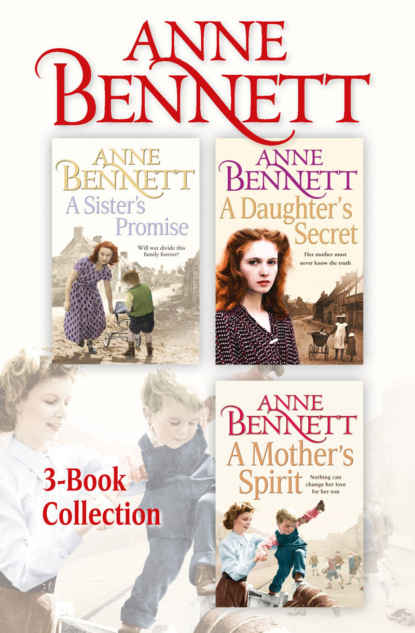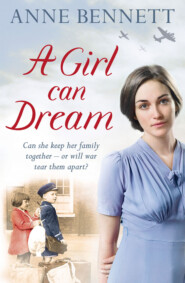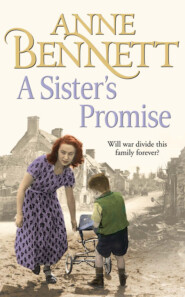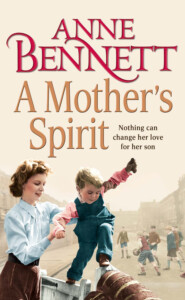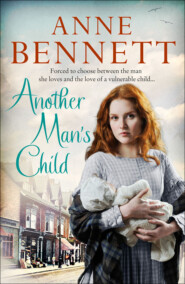По всем вопросам обращайтесь на: info@litportal.ru
(©) 2003-2025.
✖
Anne Bennett 3-Book Collection: A Sister’s Promise, A Daughter’s Secret, A Mother’s Spirit
Настройки чтения
Размер шрифта
Высота строк
Поля
Tom had no idea of Molly’s rising panic, but he had noted her exhausted state and said. ‘There is no need for this, Mammy. I don’t need anyone to help me. Haven’t I been doing it alone for a fair few years anyway?’
‘Aye, but there is no need for you to do it alone now. You have help.’
‘Can’t you see the child is worn out?’ Tom said. ‘She has been travelling all the day.’
‘I have told Molly there is no place for passengers on a farm, and the sooner she is made aware of this, the better it will be for everybody,’ Biddy said with some satisfaction.
Molly wanted to say she had never had any desire to milk a cow and didn’t particularly want to learn either, but she had already decided that she would show no weakness in front of this woman. So, turning to Tom, she said, ‘You will have to show me how it is done.’
Biddy may have been disappointed with Molly’s response, but Tom was full of admiration. ‘There is nothing to it,’ he said. ‘You’ll pick it up in no time. Let’s whistle up the dogs to help bring them down.’
Tom was patient and kind, and his voice so calm that Molly could never imagine it raised in anger, or indeed anything else, and it was like balm to her bruised and battered soul. He seemed to understand her initial distaste, but he was so gentle and reassuring that Molly battled to overcome this because she knew it would please him.
She was quick to learn generally, and soon got the hang of milking. She even began to enjoy it, finding, like many more, there was something incredibly soothing about sitting astride a three-legged stool, her face pressed against the velvet flank of the cow, and gently but firmly squeezing the udders and seeing the bucket fill with the squirts of milk.
‘Molly,’ said Tom after a while, ‘let me give you a word of warning. Don’t rise to Mammy’s bait. Let her rant and rave and all, and you say nothing. Eventually, she will have to stop.’
‘Yes, but when she says thing about my family …’
‘She says that because she knows it upsets you,’ Tom said.
‘She told me that my mother killed her father,’ Molly said. ‘Was that true?’
Tom sighed. ‘When Daddy read the letter Nuala sent, telling of how she met your father and wanting to become engaged, and about his being a Protestant and all, Daddy had a heart attack.’
‘So she did then, in a way?’
‘Yes and no,’ Tom said. ‘Not long after Nuala left for England, Daddy developed pains in his chest and he was diagnosed with a bad heart. He knew he was on borrowed time – we all knew. The doctor said he could go any time, but Mammy said that Nuala wasn’t to be worried about it. If she had known maybe she would have come over in person and told him herself more gently, so I don’t think she can be blamed.’
‘She wasn’t told anything,’ Molly said. ‘Surely she should have been told her own father died?’
‘Of course she should,’ Tom said. ‘I blame myself. I should have stood against Mammy. She was just so adamant.’
Uncle Tom was soft, a fact Molly had realised within a few minutes of meeting him. She would take a bet that he hated confrontation of any kind so, much as she liked him, she doubted that she could depend on him for support.
He did try objecting when, on their return to the house, Biddy told Molly to wash the pots and to be quick about it, because she had to be up early in the morning for milking.
‘Mammy, for God’s sake, let the girl lie in tomorrow at least.’
Biddy continued to Molly as if Tom hadn’t spoken, ‘And first you will kindle up the fire from the rakings, clean out the ashes and fill the kettle, and put it on before joining Tom in the cowshed. Oh, and you can leave your lah-d-dah city clothes in the wardrobe. They will do for Mass, but are not suitable for work on the farm. While you were at the milking I fashioned you a couple of working shirts and a pair of dungarees from things I had in the house. Put them on in the morning.’
‘You’ll kill the girl before you’re done,’ Tom commented morosely, and Biddy smiled as if that would be a quite acceptable outcome.
The next morning Molly rose before five o’clock, put on the clothes her grandmother had given her and surveyed herself in the mirror. She supposed the shirts and dungarees were more serviceable, but she didn’t like them much, and they were rather big for her – so big that she had to roll up the sleeves of the shirts and the legs of the trousers over and over. Tom had already left to collect up the cows, and so the first time he saw the clothes was when Molly appeared in the cowshed a little later.
He laughed his head off. ‘God Almighty,’ he said. ‘You’d fit in them twice over. They were probably Finn’s once, or Joe’s even, and both were a sight bigger than you.’
Molly knew who Finn and Joe were for she had asked many questions about her mother’s family though Nuala had known nothing about them from the day she had left. Molly had known about Finn’s death, of course, but nothing of Joe.
She said now, ‘What happened to Joe? Mom always thought he would be here on the farm with you, but my grandmother told me that he had gone to America.’
‘Aye,’ Tom said, ‘and, God’s truth, I couldn’t blame him. With Finn gone and Nuala too and Daddy dying, the place was not the same at all. In the end he could take no more. Anyway, as he said, what was he doing working his fingers to the bone on a farm that would never be his?’
‘Is he still there now?’
‘Aye, and he didn’t do badly at first,’ Tom said. ‘Well, he ended up marrying the boss’s daughter, a girl called Gloria, and probably thought he was set for life, but then there was something called the Wall Street Crash and …’
‘What was that?’
‘Oh, it’s to do with stocks and shares,’ Tom said. ‘And I have never had any truck with them. But it meant the boss, Joe’s father-in-law, lost a heap of money and ended up killing himself.’
‘Golly!’
‘Joe was left with the debts the man had rung up,’ Tom said. ‘The house and fine way of living had to go, and he had a wife and mother-in-law to support and no means of doing so. I asked him to come here, but he can’t because the mother-in-law refuses to leave the land where her husband is buried and so they live in a downtown tenement, surviving on handouts or the odd day’s work Joe gets in a factory or down at the docks. It was worsened by the birth of their son, Ben, last year.’
‘Sad, isn’t it?’ Molly said wistfully. ‘You think your life will just go on the way it always has been and then something happens and the whole thing goes up in the air. Your brother is stuck just like I am.’
‘That’s about it,’ Tom said. ‘You won’t be stuck here for ever, though, young Molly, don’t fret. But if you don’t want Mammy giving out to us both for wasting time, we’d best be away back to the house, now we have finished the milking.’
Molly soon found that there is an art to filling a kettle from a full bucket of water and that it took time to acquire it. The first time she tried she swamped the floor and she knew if she hadn’t been able to clear away the evidence of this before Biddy got up, then she would probably have joined Tom in the cowshed with a thick ear.
She was always more than ready for her breakfast after milking, which was a boiled egg or porridge, and she ate her fill. She was aware almost from the first day that once she rose from that table it would be a long time before she had the opportunity to rest her legs again. Her grandmother saw to that.
Once she had put the water on to boil for the washing-up, Tom would fill up the buckets again. A large pan of water would be needed to scald the drinks for the two calves in the byre and to boil up the potatoes and turnips to feed the indolent, smelly pig and her litter of squealing piglets. Then Molly would feed the dogs and the hens, and collect and wipe the eggs.
After the Angelus bell had rung at twelve o’clock, they would stop for dinner. Sometimes this would just consist of potatoes and shallots, though Tom told her there was fish most Saturdays after they had been to the market, and other days in the week if there was ever the occasion to go into the town again and the fishing fleet was in.
‘I bag the odd rabbit as well,’ he said. ‘And of course when a pig is killed we might enjoy a bit of pork, and if there is an old hen not laying at all well, then she might just find herself with her neck wrung.’
‘Ugh!’
Tom laughed. ‘I suppose you got all your meat from the butchers all nicely packed and packaged,’ he said. ‘Well, this is where it all starts, and I’ll tell you, we are glad enough to see a bit of meat or fish when we have had potatoes and just potatoes for time and enough.’
After dinner that first day, Biddy took Molly on one side to teach her how to make soda bread and bread with oaten meal. ‘This needs to be done three times a week,’ she said. ‘On Saturdays, of course, you will also make scones, barnbrack and potato cakes for Sunday, and in addition to this on Thursday, you will do the churning and Monday is, of course, wash day and that will take some time. And remember whatever other duties you have, you will go with Tom to do the milking twice a day.’
Molly knew the workload would be a heavy one, but after only a day or so she found that she valued those peaceful times with her uncle in the cowshed. Biddy never went near it and so it was sort of a special place, where she could get away from her grandmother’s whining, complaining voice and the clouts that she seemed to find necessary to administer for the most minor things. But Molly was no fool, and she never, ever showed how much she enjoyed, even sometimes looked forward to, the milking. She knew that it was her grandmother’s intention to make her life as miserable as possible.
On Thursday afternoon, Biddy prepared the churn, while Molly washed up the dinner dishes and then showed her what to do.
‘Up and down for twenty minutes,’ she said, handing her the paddle. ‘And without stopping.’
Molly tried valiantly, but after a few minutes her arms felt like lead weights and she laid down the paddle with a sigh.
Biddy cuffed her on the side of the head, sending her senses reeling. ‘Twenty minutes, I said.’
‘I can’t.’
‘You can if you want to eat tonight.’





